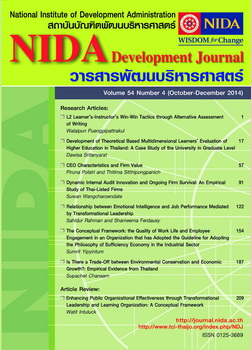Dynamic Internal Audit Innovation and Ongoing Firm Survival: An Empirical Study of Thai-Listed Firms
Main Article Content
Abstract
The purpose of this study is to investigate the effects of dynamic internal audit innovation on ongoing firm survival via the mediating influences of organizational outcomes, which include financial repletion reporting, risk reduction, and comported performance achievement. Information technology change, regulation enforcement, and volatile business are hypothesized to become the antecedents of dynamic internal audit innovation. Also, intra-cooperation communication and environmental turbulence are the moderating variables of the relationship between dynamic internal audit innovation-organizational outcomes and organizational outcome-ongoing firm survival. Data were collected from internal audit directors amount 128 persons from Thai-Listed firms. A questionnaire was analyzed by using the Ordinary Least Squares (OLS) regression analysis. The results of the OLS regression analysis revealed that dynamic internal audit innovation had a positive influence on all organizational outcomes. In addition, financial repletion reporting, risk reduction, and comported performance achievement had a positive effect on ongoing firm survival. Moreover, two antecedents—information technology change and volatile business—also had a positive effect on dynamic internal audit innovation. Additionally, the focus of intra-cooperation communication and environmental turbulence showed partially positive supporting effects on dynamic internal audit innovation-organizational outcomes and organizational outcome-ongoing firm survival. However, future research is needed to collect in-depth data so as to reflect the actual concept of dynamic internal audit innovation. Finally, the advantages of internal auditing are a key factor that leads to add organization value, to support the auditor’s task and enhance organization sustainability.
Article Details
Section
Articles

